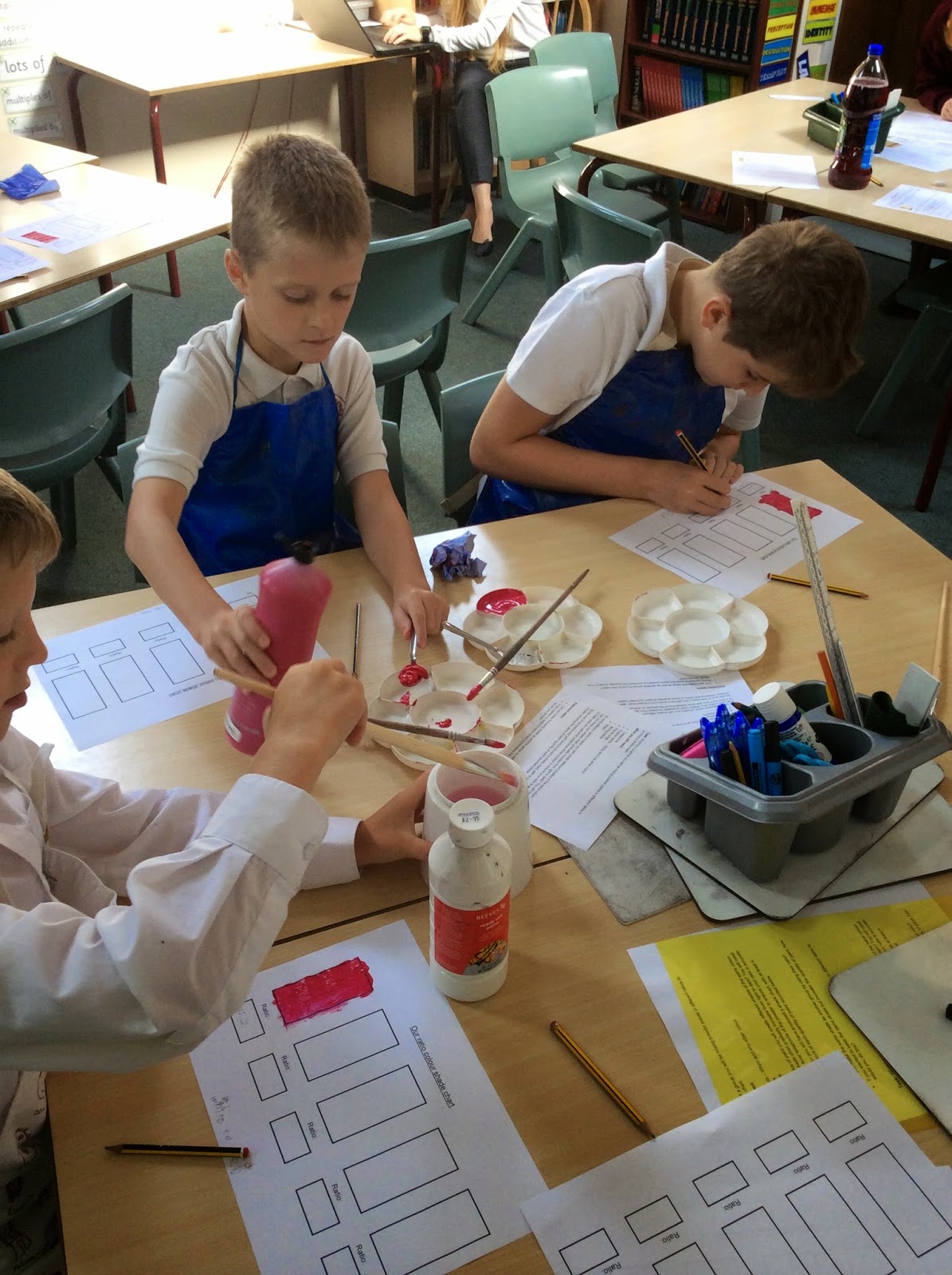Our task today was to write a poem about WWI and life in the trenches. Before we could write our poem we needed to know how it would feel to be in the trenches. In order to experience this we created a trench in the classroom and listened to sound effects. We then came up with ideas about the conditions in the trenches, using the 5 senses we came up with: hearing sounds of the wounded, the feeling of being cramped and the smell.
In our poems we needed to include different literary devices such as: metaphor, similes, alliteration, repetition, onomatopoeia, rhyme.
Friday, 10 October 2014
Ratio
Today we learned that ratio can be used in practical ways such as: cooking, building, making squash and mixing shades of colours. We can simplify ratio for example: 3:9 = 1:3
Each of the numbers represents a part so 1:3 means there are 4 parts in total.
We were making squash so if the ratio was water to squash - 11:3 you would need 11 parts water and 3 parts squash. You cannot write the ratio 3:11 because you'll end up with 3 parts water and 11 parts squash - making the wrong consistency.
Here are some pictures of what we did today:
Each of the numbers represents a part so 1:3 means there are 4 parts in total.
We were making squash so if the ratio was water to squash - 11:3 you would need 11 parts water and 3 parts squash. You cannot write the ratio 3:11 because you'll end up with 3 parts water and 11 parts squash - making the wrong consistency.
Here are some pictures of what we did today:
Monday, 6 October 2014
Dance
Today in Mr Bull's P.E lesson, we were focusing on Ancient Greek Olympics. We were performing entrances, boxing sequences and sword fight routines in pairs. We needed to include:
- Facial expressions - show emotion
- Reactions that were in time with the actions
- Accurate timing, correct to the music.
Thursday, 2 October 2014
Our school visit from Mike Penning
Today we had a visit from Mike Penning, our local MP, he spoke to us about his life, family and his job.
We discovered that he is a SPURS fan!!! Also, that he has a license to drive a tank. Some of his previous jobs were a fireman, policeman and a journalist. One of his two daughters lives in Australia as a Marine Biologist, his other daughter is a teacher at Galley Hill School.
Our School Council recently had a visit to the Houses of Parliament, unfortunately Mr Penning was not there, we found out today that he was in Washington D.C!
During his visit this morning, we asked Mike a range of questions:
We discovered that he is a SPURS fan!!! Also, that he has a license to drive a tank. Some of his previous jobs were a fireman, policeman and a journalist. One of his two daughters lives in Australia as a Marine Biologist, his other daughter is a teacher at Galley Hill School.
Our School Council recently had a visit to the Houses of Parliament, unfortunately Mr Penning was not there, we found out today that he was in Washington D.C!
During his visit this morning, we asked Mike a range of questions:
- When was the Houses of Parliament built?
- How do you raise money to keep the Houses of Parliament running?
- How many parties are there?
- As an MP, how do you feel about troops being sent to war?
On behalf of Great Gaddesden School we would like to say a great big thank you to our local MP, Mike Penning, for coming in to speak with us today.
Tuesday, 30 September 2014
English - flashbacks
In English today we looked at a short video clip, 'The Piano'. Our focus was to include flashbacks in our writing- we wrote some group flashbacks, here is as example:
Everyday, I sit there and play my
favourite piece of music. Specifically, I play the music that reminds me of the
war; back in the days when I
was a medic in the Navy. As I listen to
my much-loved pieces, I remember memories of my past; memories that have lasted
a lifetime. The music brings back the memories of the times I risked my life to
comfort the wounded. Specifically, the time when I lost my brother. I ran to
save him but I was too late.
By Neive, Dylan, Harry and Krysta
Wednesday, 17 September 2014
Living things - Science
In Science today we discovered who Carl Linnaeus is and what he is most famous for. He renamed flowers from the overly long Latin names to one or two word names that we know now. We learned that if an L. appears after a scientific name it
tells us that Linnaeus named that living thing. A dagger sign after a name
shows that the living thing is extinct!
Aristotle categorised animals into different headings by looking at their appearance and features.
Aristotle categorised animals into different headings by looking at their appearance and features.
War Horse
Our focus in English is WWI, we've been reading War Horse. We also went to the theatre last Thursday to see War Horse live on stage, during our time in London we visited the War Memorial at the Tower of London - the ground was covered with poppies.
From our day out we have written a review and we are currently writing our own war stories.
From our day out we have written a review and we are currently writing our own war stories.
Subscribe to:
Posts (Atom)











